Trustworthy Group Recommendation
Key Idea
Our research in Trustworthy Group Recommendation focuses on developing fair,
transparent, robust, and user-aligned algorithms that support effective group decision-making,
with applications like ULTRA that quickly help form research teams and match them with relevant
funding opportunities.
Quick Start
-
See our latest work on BEACON [demo], a personalized
meal planning system to assist with making optimized meal choices over a time period, incorporating
various food restrictions, chronic health conditions, regional cuisine preferences, as well as
balancing short- and long-term constraints to promote individual health and happines
[Paper]
[Github - capstone prototype]
-
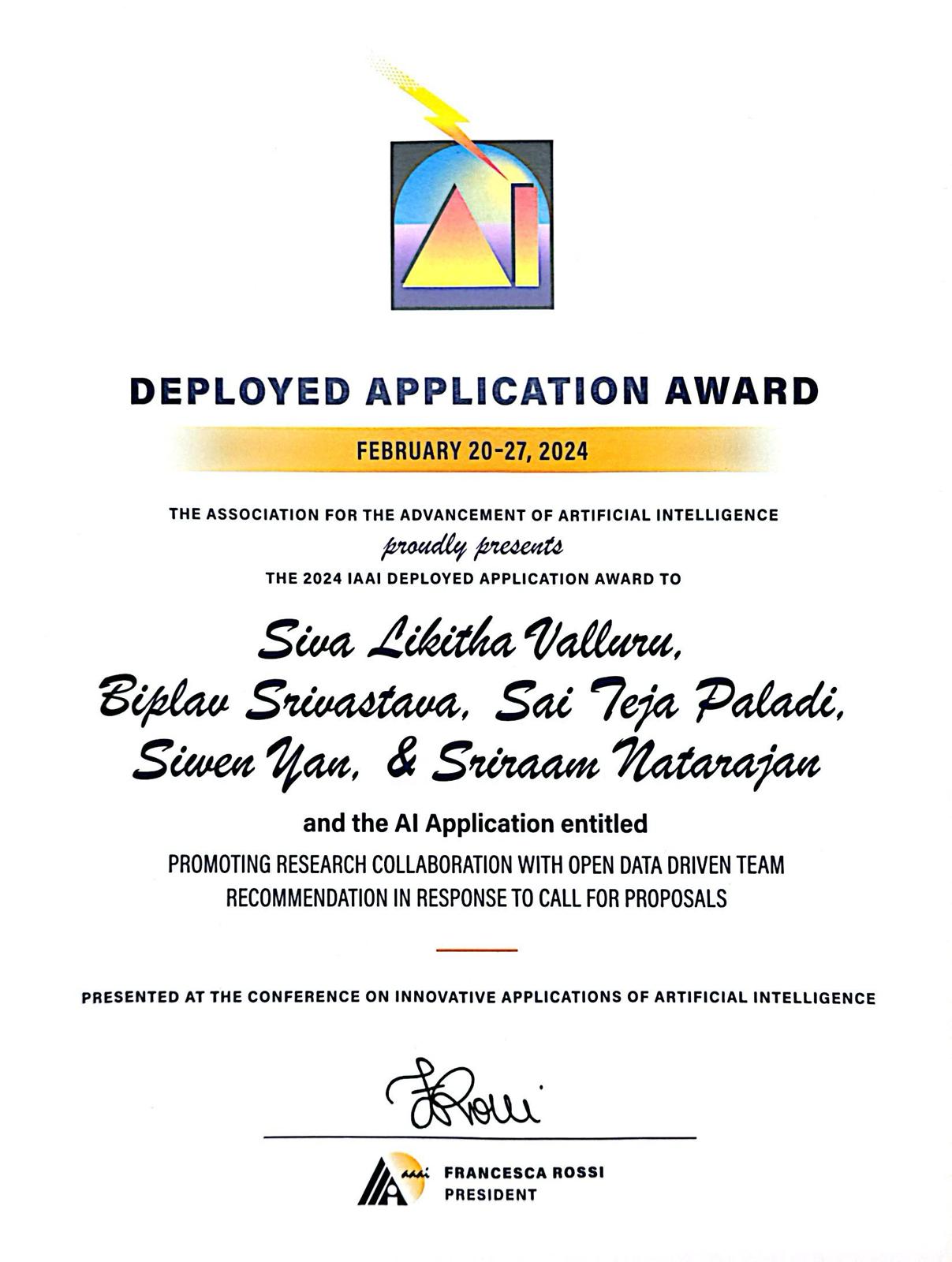 See our past work on ULTRA, a novel AI-based system for assisting team formation when researchers
respond to RFPs from funding agencies. It has been awarded the Deployed Application Award by
AAAI-IAAI 2024 (can be enlarged on the right) and featured in AI Magazine 2024:
[Paper]
[Demo Website]
See our past work on ULTRA, a novel AI-based system for assisting team formation when researchers
respond to RFPs from funding agencies. It has been awarded the Deployed Application Award by
AAAI-IAAI 2024 (can be enlarged on the right) and featured in AI Magazine 2024:
[Paper]
[Demo Website]
×
![]()
Group Recommendation and Fairness
Key Contacts: Biplav Srivastava, Siva Likitha Valluru,
Michael Huhns,
Sriraam Natarajan
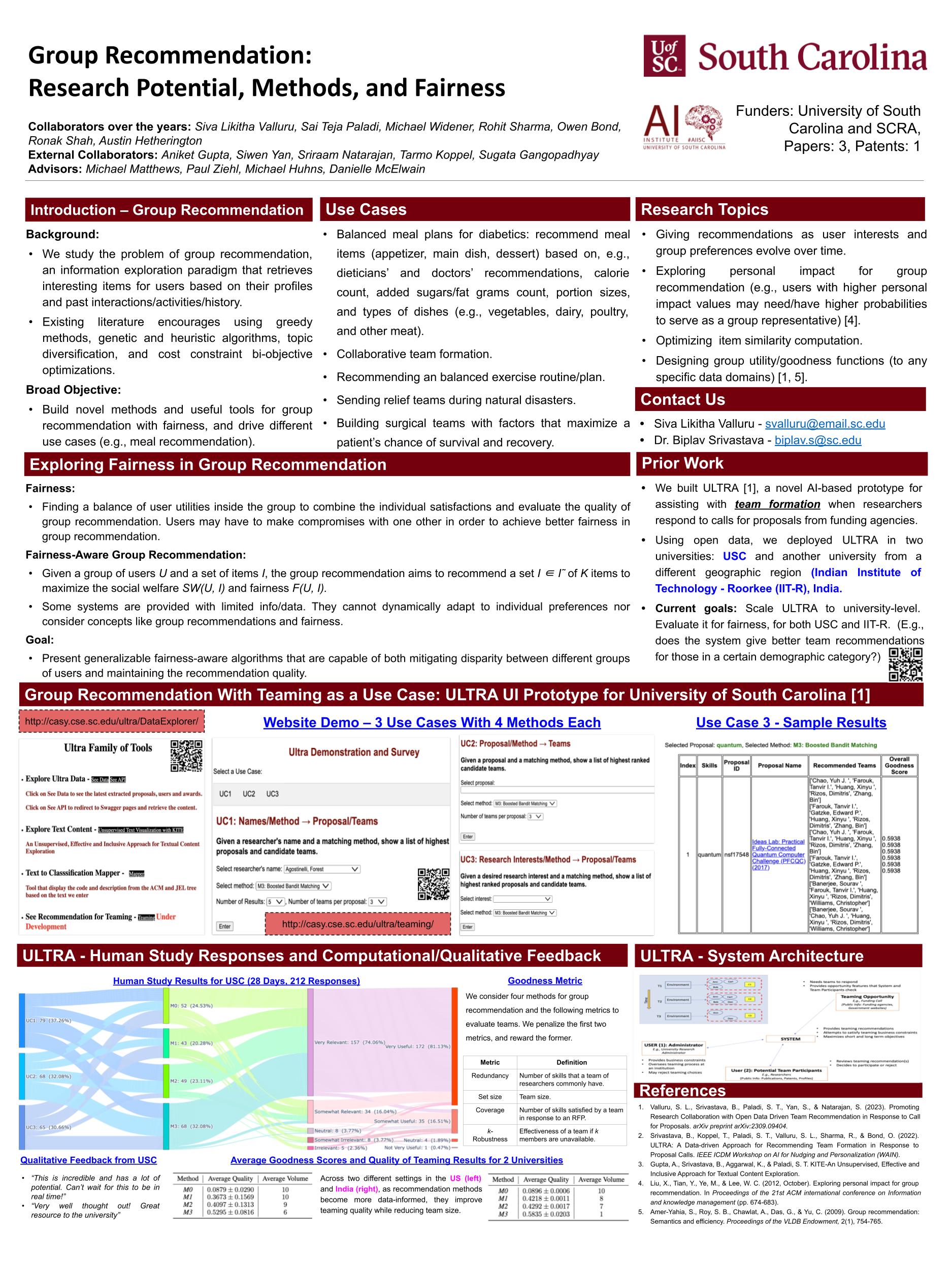 We study the problem of group recommendation, an information exploration paradigm that retrieves
interesting items for users based on their profiles and past interactions/activities/history. Existing
literature encourages using greedy methods, genetic and heuristic algorithms, topic diversification,
and cost constraint bi-objective optimizations. Our objective is to build novel methods and useful
tools for group recommendation with fairness, and drive different use cases (e.g., meal
recommendation). We study the problem of group recommendation, an information exploration paradigm that retrieves
interesting items for users based on their profiles and past interactions/activities/history. Existing
literature encourages using greedy methods, genetic and heuristic algorithms, topic diversification,
and cost constraint bi-objective optimizations. Our objective is to build novel methods and useful
tools for group recommendation with fairness, and drive different use cases (e.g., meal
recommendation).
The underlying research directions and applications are summarized in the poster to the right
(can be enlarged).
×
![]()
Team Formation
Technical Lead: Biplav Srivastava
Collaborators over the years:
Siva Likitha Valluru,
Sai Teja Paladi, Michael Widener,
Rohit Sharma,
Owen Bond,
Ronak Shah,
Austin Hetherington
External Collaborators:
Aniket Gupta,
Siwen Yan,
Sriraam Natarajan,
Tarmo Koppel,
Sugata Gangopadhyay
Advisors: Michael Matthews,
Paul Ziehl,
Michael Huhns,
Danielle McElwain
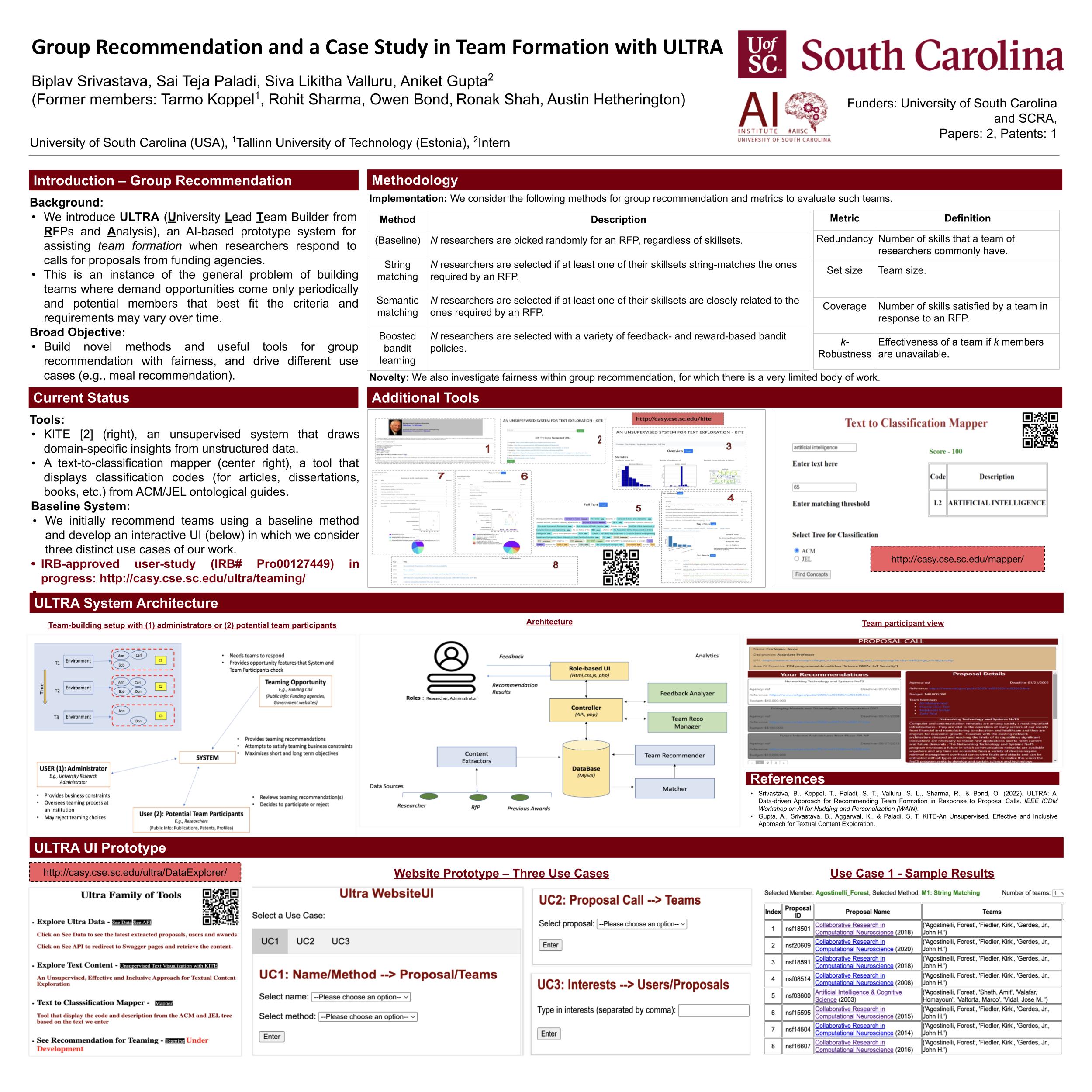 We introduce
ULTRA (University Lead Team Builder from RFPs and Analysis), a novel AI-based system for assisting team formation when researchers respond to RFPs from funding
agencies. This is an instance of the general problem of building teams when demand opportunities come
periodically and potential members may vary over time. The novelties of our approach are that we: (a)
extract technical skills needed about researchers and calls from multiple open data sources and
normalize them using NLP techniques, (b) build teaming solutions based on constraints, (c)
computationally and qualitatively evaluate our system in two diverse settings (US, India) to establish
generality of our approach, and (d) create and publish a dataset that others can use. We introduce
ULTRA (University Lead Team Builder from RFPs and Analysis), a novel AI-based system for assisting team formation when researchers respond to RFPs from funding
agencies. This is an instance of the general problem of building teams when demand opportunities come
periodically and potential members may vary over time. The novelties of our approach are that we: (a)
extract technical skills needed about researchers and calls from multiple open data sources and
normalize them using NLP techniques, (b) build teaming solutions based on constraints, (c)
computationally and qualitatively evaluate our system in two diverse settings (US, India) to establish
generality of our approach, and (d) create and publish a dataset that others can use.
(This research study has been certified as exempt from the IRB per 45 CFR 46.104(d)(3) and 45 CFR
46.111(a)(7) by University of South Carolina IRB#Pro00127449.)
Representative Publications
Additional Tools
Collaborators over the years:
Aniket Gupta,
Biplav Srivastava, Karan Aggarwal,
Sai Teja Paladi
Here, we describe some of the important tools that we have developed as part of the
ULTRA
effort. They started out as useful features that we then made into stand-alone capabilities
recognizing their potentia for wider usage:
-
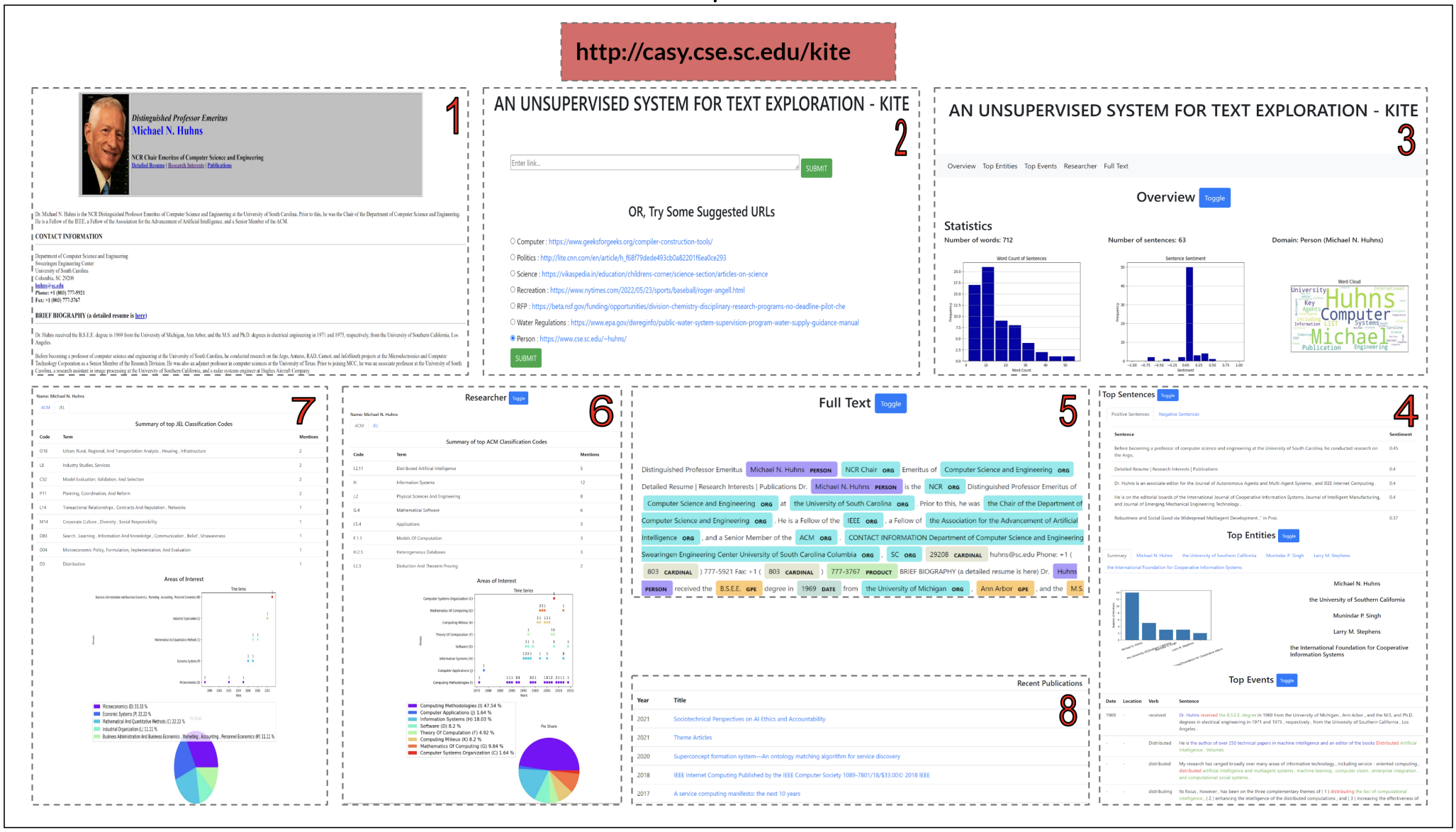 KITE (right) is an unsupervised system for exploring textual
data which can generate insights from a general as well as a domain-dependent perspective
consisting of holistic views, entity-centric view, events view, domain-specific interpretation
using industry taxonomies and a detailed full-text view transparently connecting the document to
insight elements. KITE (right) is an unsupervised system for exploring textual
data which can generate insights from a general as well as a domain-dependent perspective
consisting of holistic views, entity-centric view, events view, domain-specific interpretation
using industry taxonomies and a detailed full-text view transparently connecting the document to
insight elements.
-
We also developed a text-to-classification mapper, a tool that takes the input as a text and matching threshold as a number and returns the
ACM or
JEL
classification codes and description based on the input text.
Representative Publications
-
[2022] KITE - An Unsupervised, Effective and Inclusive Approach for Textual Content Exploration.
[Tool Website]
[Paper]
[GitHub]
[BibTex]
-
[2022] A Text-to-Classification Mapper (Using ACM/JEL Subject Ontology Codes).
[Tool Website]
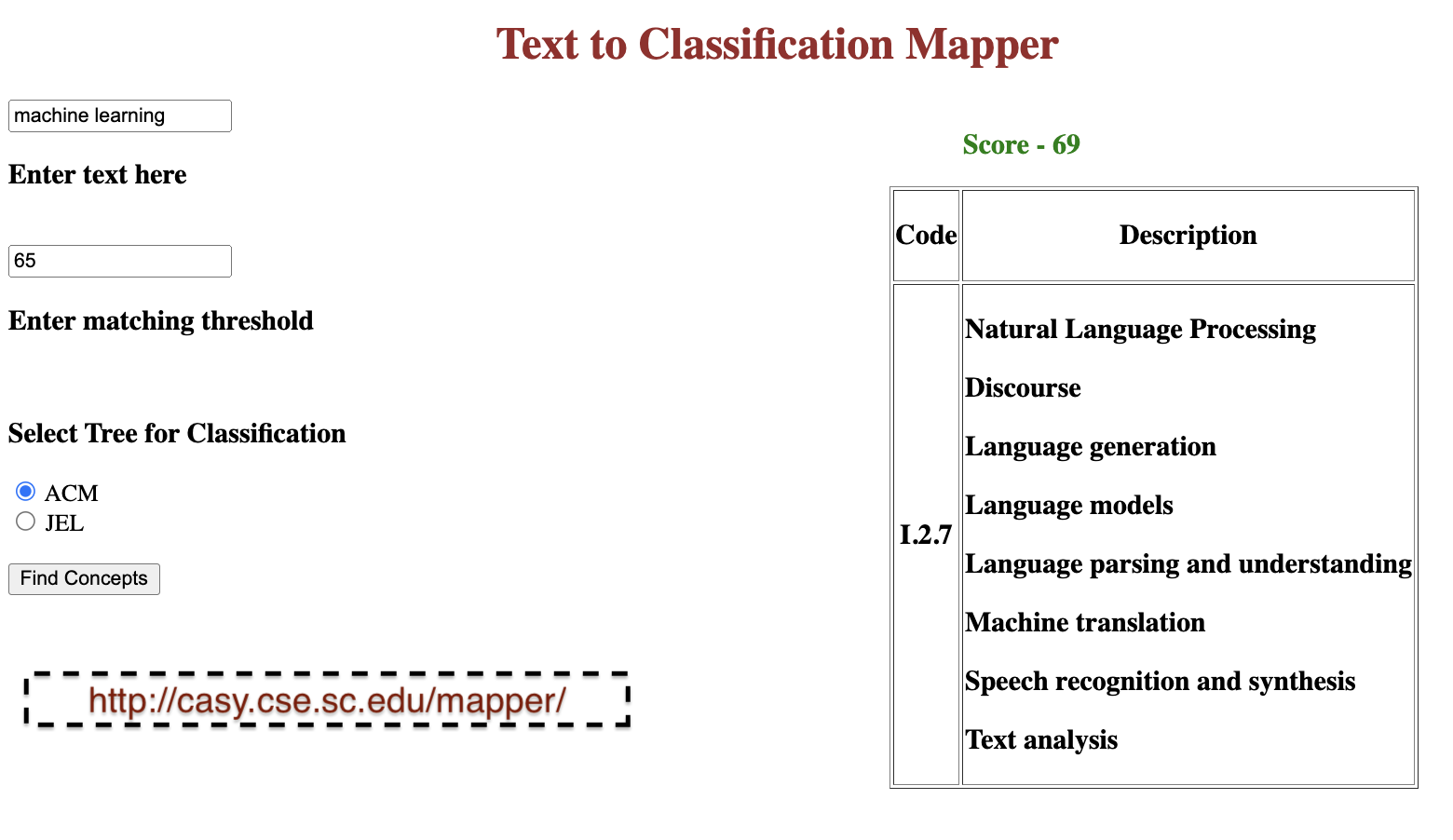
Figure 3: A demo of text-to-classification mapper.
Meal Recommendation
Meal Recommendation
Key Contacts:
Vansh Nagpal,
Kausik Lakkaraju,
Siva Likitha Valluru,
Biplav Srivastava
BEACON System - Now Available!
We have developed BEACON (Balancing Convenience and Nutrition), a
personalized meal planning system that helps people make optimized meal choices over time periods.
The system incorporates food restrictions, chronic health conditions, regional cuisine preferences,
and balances short- and long-term constraints to promote individual health and happiness.
[Live Demo]
[Paper]
[GitHub]
Personal health can benefit significantly from meals planned over extended periods, whether for a
single day, a three-day travel period, or an entire week. Our research addresses this through
BEACON, a data-driven meal recommender system designed to help both
healthy individuals and people with health conditions (such as diabetes) make optimized meal choices.
The system leverages several innovative components:
-
Variable Meal Configurations: Users can customize meal structures (breakfast, lunch, dinner)
with different components (main course, side dishes, beverages, desserts)
-
Flexible Time Horizons: Recommendations span from single days up to multi-day periods,
enabling better long-term planning
-
Rich Recipe Representation (R3): Recipes are converted from text to a structured, multimodal
format that captures both content and preparation processes
-
Advanced Recommendation Algorithms: Using contextual bandits and reinforcement learning, the
system learns user preferences and provides highly personalized recommendations
-
Comprehensive Goodness Metrics: Evaluations consider duplicate avoidance, meal coverage, and
alignment with user dietary constraints
-
Fairness Evaluation: Ensures recommendations are unbiased and not stereotyped toward any
group of food items or user demographics
The system has been deployed and tested with real users, demonstrating significant improvements over
baseline methods in balancing convenience with nutritional needs. BEACON represents a novel approach
to meal recommendation that moves beyond simple food suggestions to comprehensive meal planning with
health optimization.
Representative Publications
-
[2025] A Novel Approach to Balance Convenience and Nutrition in Meals With Long-Term Group
Recommendations and Reasoning on Multimodal Recipes and its Implementation in BEACON
Presented at WAIN workshop at IEEE ICDM 2025
[Paper]
[Demo]
[GitHub]
-
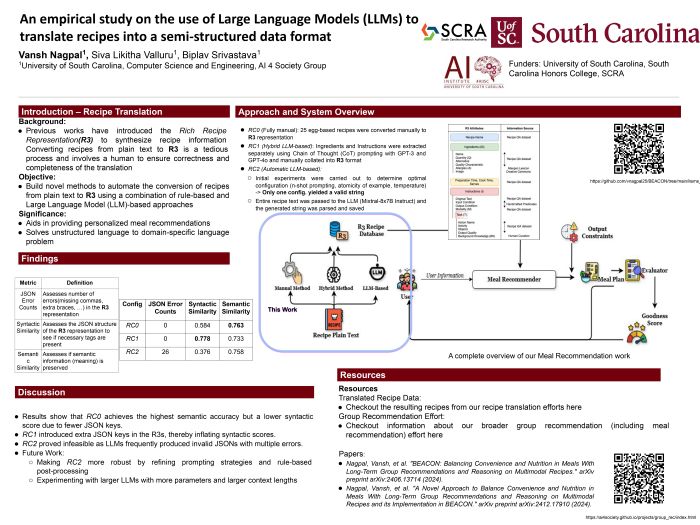 [2025] An empirical study on the use of Large Language Models (LLMs) to translate recipes into a
semi-structured data format [2025] An empirical study on the use of Large Language Models (LLMs) to translate recipes into a
semi-structured data format
Conference Poster at the National Big Data and Health Science Conference
[Poster]
-
[2024] A Novel Approach to Balance Convenience and Nutrition in Meals With Long-Term Group
Recommendations and Reasoning on Multimodal Recipes and its Implementation in BEACON
Presented at National Big Data and Health Science Conference 2025
as
A Digital Twin for Increasing Adherence to Dietary Guidelines with Personalized, AI-Driven, Long
Duration Meal Recommendations.
[Paper]
[BibTex]
-
[2024] BEACON: Balancing Convenience and Nutrition in Meals With Long-Term Group Recommendations and
Reasoning on Multimodal Recipes
Arxiv Preprint
[Paper]
[BibTex]
Recipe Recommendation
Collaborators over the years:
Vishal Pallagani,
Vedant Khandelwal,
Kausik Lakkaraju,
Revathy Venkataramanan,
Biplav Srivastava
External Collaborators: Priyadharsini Ramamurthy,
Hem Chandra Joshi,
Sathyanarayanan N. Aakur,
Ram Manohar Singh
Cooking domain is a popular use-case to demonstrate decision-support (AI) capabilities in service of
benefits like precision health with tools ranging from information retrieval interfaces to
task-oriented chatbots. The recipes today are handled as textual documents which makes it difficult
for machines to read, reason and handle ambiguity. This demands a need for better representation of
the recipes, overcoming the ambiguity and sparseness that exists in the current textual documents. We
constructed a machine-understandable
rich recipe representation (R3), in the form of plans, from the
recipes available in natural language. R3 is infused with additional knowledge such as information
about allergens and images of ingredients, possible failures and tips for each atomic cooking step.
To show the benefits of R3, we also built TREAT, a tool for recipe
retrieval which uses R3 to perform multi-modal reasoning on the recipe's content (plan objects -
ingredients and cooking tools), food preparation process (plan actions and time), and media type
(image, text). R3 leads to improved retrieval efficiency and new capabilities that were hither-to not
possible in textual representation.
Representative Publications
-
[2022] A Rich Recipe Representation as Plan to Support Expressive Multi-Modal Queries on Recipe
Content and Preparation Process
Workshop on Knowledge Engineering for Planning and Scheduling (KEPS), International Conference on
Automated Planning and Scheduling (ICAPS)
[Paper]
[BibTex]

Figure 4: Difference between textual representation and R3 for a single instruction.
-
[2022] A Multi-Modal Decision Support System with Allergy-Aware Recipe Understanding Powered
by a Plan Representation
[Paper]
[BibTex]

Figure 5: Result of user query of asking recipes containing bacon.
|
|
 We study the problem of group recommendation, an information exploration paradigm that retrieves
interesting items for users based on their profiles and past interactions/activities/history. Existing
literature encourages using greedy methods, genetic and heuristic algorithms, topic diversification,
and cost constraint bi-objective optimizations. Our objective is to build novel methods and useful
tools for group recommendation with fairness, and drive different use cases (e.g., meal
recommendation).
We study the problem of group recommendation, an information exploration paradigm that retrieves
interesting items for users based on their profiles and past interactions/activities/history. Existing
literature encourages using greedy methods, genetic and heuristic algorithms, topic diversification,
and cost constraint bi-objective optimizations. Our objective is to build novel methods and useful
tools for group recommendation with fairness, and drive different use cases (e.g., meal
recommendation).  See our past work on ULTRA, a novel AI-based system for assisting team formation when researchers
respond to RFPs from funding agencies. It has been awarded the Deployed Application Award by
AAAI-IAAI 2024 (can be enlarged on the right) and featured in AI Magazine 2024:
See our past work on ULTRA, a novel AI-based system for assisting team formation when researchers
respond to RFPs from funding agencies. It has been awarded the Deployed Application Award by
AAAI-IAAI 2024 (can be enlarged on the right) and featured in AI Magazine 2024:
 We introduce
We introduce
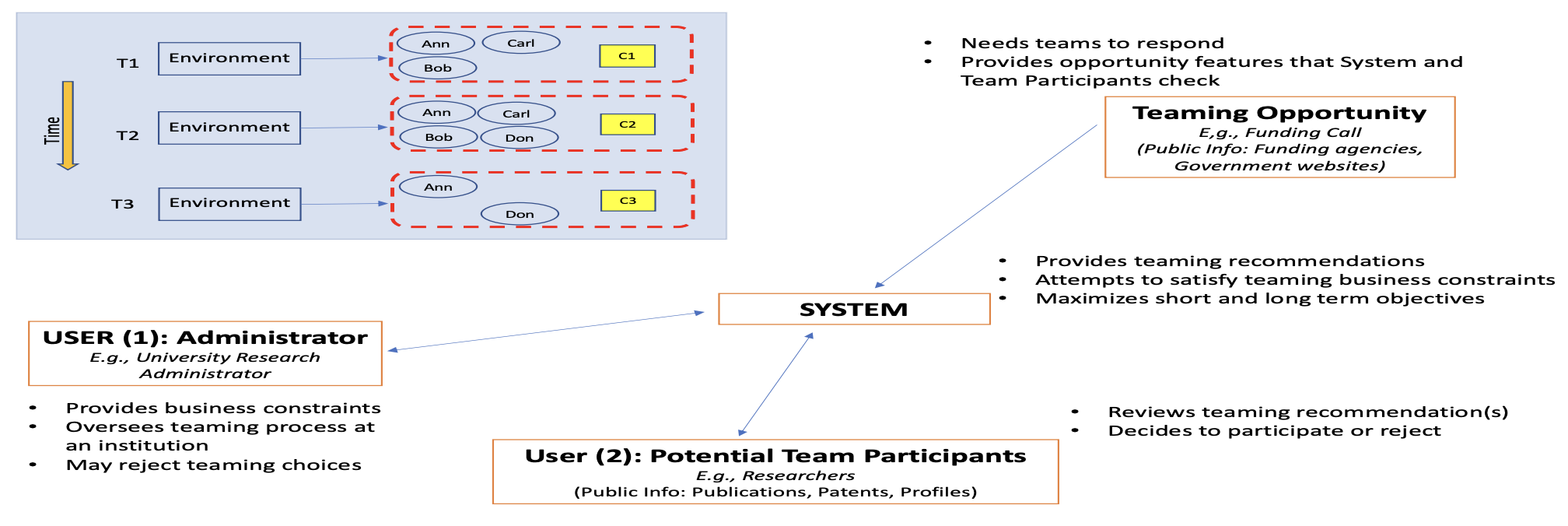
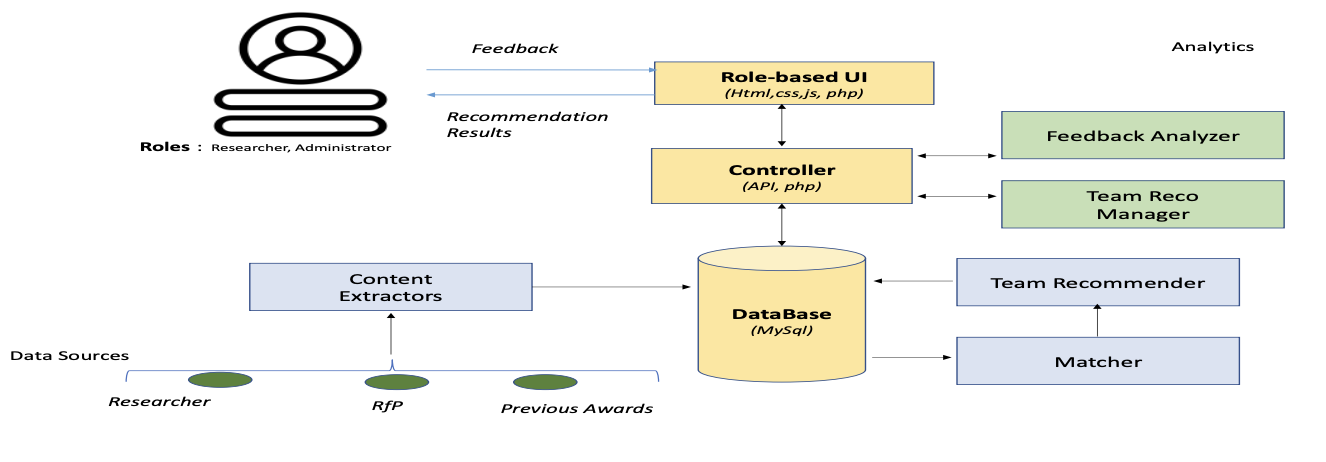


 [2025] An empirical study on the use of Large Language Models (LLMs) to translate recipes into a
semi-structured data format
[2025] An empirical study on the use of Large Language Models (LLMs) to translate recipes into a
semi-structured data format 
